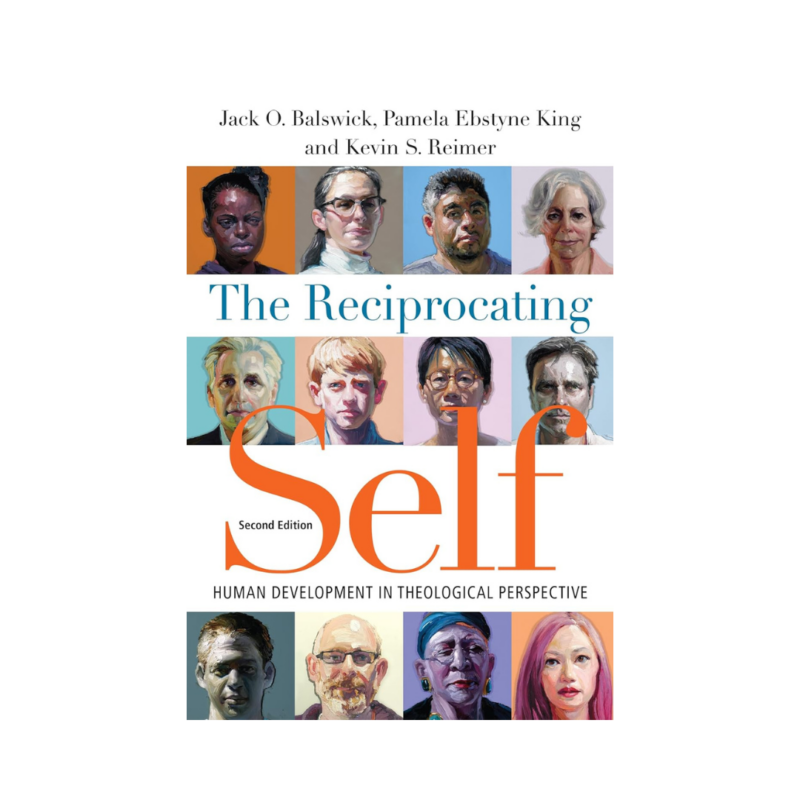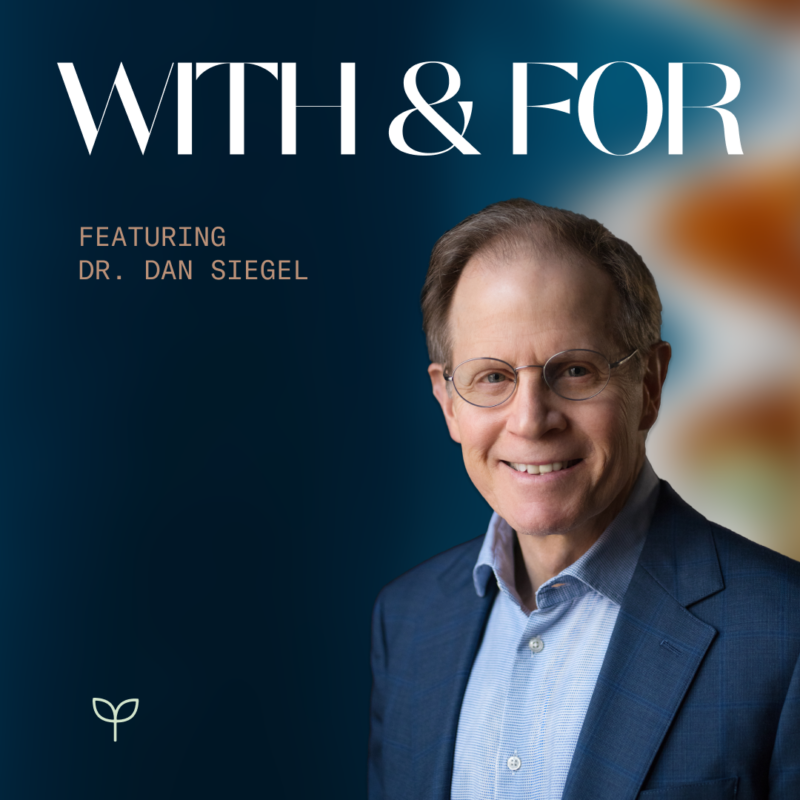Episode Summary
We are made for relationships. And psychiatrist, researcher, and clinical therapist Dr. Dan Siegel (UCLA) has found that emotional realities of our earliest attachment relationships reverberate through the rest of our lives. By opening up brain science and what he calls “interpersonal neurobiology” he’s helping people find emotional healing and wholeness, deep connection, and stable life-giving relationships.
Show Notes
Help inspire the future of With & For! Click HERE to take our short survey! Four respondents will get a special box of goodies from the Thrive Center!
“Our relationships really shape how we feel, how we think, how we remember things, how we tell the story of who we are, the sense of self, where you focus your attention, what gives you a sense of purpose. Relational integration in a family leads to the growth of neural integration inside the child's nervous system. Every time you say regulation—like regulating emotion or your mood, regulating attention, thought behavior, self-understanding, morality—it depends on integration in the brain. So the neural integration is the basis for optimal regulation, but it comes from relational integration. We all can follow Picasso's suggestion, which I think is really beautiful: The meaning of life discovering our gift. The purpose of life is giving it away.” (Dan Siegel) In developmental science, there are lots of debates between nature and nurture. And Dr. Dan Siegel’s groundbreaking work in interpersonal neurobiology demonstrates that we are naturally wired for nurture—and furthermore, we cannot thrive without it. Over the past five decades, he has sought to explain through attachment theory and a study of the brain, how relationships shape our feelings, thoughts, memories, stories and personal narratives, and how all these offer an opportunity for us to integrate all of our personal subjective with the world outside us. Our relational tendencies and inner being are malleable—always growing and changing. We are under construction our entire lives, and that’s good news for those of us who feel the weight of loneliness, relational struggle, or the challenges of mental illness. Dan Siegel’s work helps us become deeply present to others—in friendships, romance, or parenting—by becoming deeply attuned to your inner life, including all of our emotions, plans, pain, and our ongoing and evolving stories. His research shows that caring and attuned relationships provide a safe and secure environment in which we can experience integration and gain insight into what is most meaningful to us. He calls this concept “mindsight”—how we gain an inner sense of self is intertwined with how we relate to others. And he offers how mindfulness and meditation are important to this process of becoming intraconnected. Life today is characterized by isolation and fragmentation, but Dan’s wisdom and practices offer helpful guidelines on how we can grow whole—and persons in deepening, reciprocating relationships.In this conversation with Dan Siegel, we discuss:
- The connection between the mind and the brain, and why that matters for our thriving
- Coming to terms with big, challenging emotions—especially fear
- How psychological integration creates flow and harmony and helps us deal with chaos and rigidity
- The scientific connection between focused attention, open awareness, and compassionate intention
- He walks us through a mindfulness exercise he calls “the wheel of awareness”
- The neurobiology of interpersonal relationships
- And we discuss how that impacts not just our spirituality and relationships, but society as a whole.
About Dan Siegel
Dr. Siegel is a Clinical Professor of Psychiatry at the UCLA School of Medicine and the founding co-director of the Mindful Awareness Research Center at UCLA. An award-winning educator, he is a Distinguished Fellow of the American Psychiatric Association and recipient of several honorary fellowships. Dr. Siegel is also the Executive Director of the Mindsight Institute, an educational organization, which offers online learning and in-person seminars that focus on how the development of mindsight in individuals, families and communities can be enhanced by examining the interface of human relationships and basic biological processes. His psychotherapy practice includes children, adolescents, adults, couples, and families. He serves as the Medical Director of the LifeSpan Learning Institute and on the Advisory Board of the Blue School in New York City, which has built its curriculum around Dr. Siegel’s Mindsight approach. He is author of many books, including, The Developing Mind: How Relationships and the Brain Interact to Shape Who We Are, Mindsight: The New Science of Personal Transformation, The Whole-Brain Child: 12 Revolutionary Strategies to Nurture Your Child's Developing Mind, Survive Everyday Parenting Struggles, and Help Your Family Thrive, Parenting from the Inside Out: How A Deeper Self-Understanding Can Help You Raise Children Who Thrive, and his most recent, IntraConnected: MWe (Me + We) as the Integration of Self, Identity, and Belonging.Show Notes
- Explore Dr. Dan Siegel’s Website Resources
- Dan Siegel’s latest book: Intraconnected: MWe (Me + We) as the Integration of Self, Identity, and Belonging
- Practicing the Wheel of Awareness (guided meditative exercises): https://drdansiegel.com/wheel-of-awareness/
- Emotional realities reverberating throughout our lives
- Picasso on meaning and purpose: “The meaning of life discovering our gift. The purpose of life is giving it away.”
- Host Pam King introduces Dr. Dan Siegel
- Living life on auto-pilot
- “For those of us feeling isolated, lonely, or cut off. You are not a finished product. … We are under construction our entire lives.”
- “What in the world is going on?”
- Growing up with an undercurrent of fear; Dan Siegel shares about his adolescence and his family dynamics
- Understanding internal, relational ecosystems
- Communicating and connecting with people in crisis; Dan Siegel on working for a suicide prevention service
- Vivek Murthy and the epidemic of loneliness
- John Lennon’s assassination and the mental illness of his murderer
- “What would a healthy mind be?”
- The 1990s: The Decade of the Brain
- What is the relationship between the mind and the brain?
- “Our relationships really shape how we feel, how we think, how we remember things, how we tell the story of who we are, the sense of self. So, you know, whatever you call those things. Feelings thinking, narrative meaning making, where you focus your attention, um, what gives you a sense of purpose.”
- Attachment research and linking relationships to the mind and the brain
- The difficulty of defining the mind for scientific study
- How could they all be correct?
- Energy transmission and connecting neurology to sociality
- Emergent Properties and “optimal self-organization that creates harmonious flow”
- Relational integration and integration in the brain
- Differentiation and linkage
- What does “integration” mean?
- Environmental factors and the shaping of attachment styles
- Parenting from the inside out
- “Feeling felt”
- Presence, attunement, regulation
- Curiosity, openness, acceptance
- What is thriving?
- Living as a verb and avoiding “nounification”
- Rashid: “Having abandoned the flimsy fantasy of certainty, I decided to wander.”
- “Wander with them through the journey of life.”
- Understand your own childhood experiences and then liberate them
- Patterns of developmental pathways
- Life is scary and full of uncertainty.
- “We've identified three subcortical networks that involve agency, which is a drive for empowerment; bonding, a drive for connection; and certainty, a drive for safety.”
- Agency - feeling seen
- Bonding - feeling soothed
- Certainty - feeling safe
- “Who we are is really energy flow.”
- Finding harmonious flow between the shores of chaos and rigidity
- VUCA life: Volatile, Uncertain, Complex, and Ambiguous.
- Minimize exposure to information
- Picasso: “The meaning of life is discovering our gift. The purpose of life is giving it away.”
- The Wheel of Awareness
- attention to be focused, awareness to be open, intention to be kind
- The hub of the wheel: the source of knowing
- The rim of the wheel: that which is known
- Creating a loving state inside you
- “Empty but full.”
- “Connected to everyone and everything”
- Feeling an open sense of love
- Christian contemplative tradition and centering prayer
- Silence and stillness—leading to heightened awareness
- The illusion of certainty
- Me + We = MWe
- Well-being and thriving
- Adaptive developmental regulation
- Leaning into love: “the manifestation of love is kindness and compassion”
- Spiritual health and being “intraconnected”
- Intraconnected: MWe (Me + We) as the Integration of Self, Identity, and Belonging
- “Feeling into the truth of our intraconnected identity”
- Host Pam King’s Key Takeaways:
- We are embodied creatures with glorious brains that we're still only beginning to understand.
- Caring attuned relationships can create opportunities for us to be and become who we are, realizing our deep connection to others.
- There's a constant balancing act between chaos and rigidity, and the path of spiritual health is marked by a steady recovery of harmonious flow. A process called integration.
- When life is scary and uncertain, we need safe relationships to ground us, help us attune and regulate and navigate the most challenging circumstances.
- And finally We need a new paradigm for reciprocal relationships in society, seeing the ways we're intra connected Knit together with and for each other.
About the Thrive Center
- Learn more at thethrivecenter.org.
- Follow us on Instagram @thrivecenter
- Follow us on X @thrivecenter
- Follow us on LinkedIn @thethrivecenter
About Dr. Pam King
Dr. Pam King is Executive Director the Thrive Center and is Peter L. Benson Professor of Applied Developmental Science at Fuller School of Psychology & Marriage and Family Therapy. Follow her @drpamking.About With & For
- Host: Pam King
- Senior Director and Producer: Jill Westbrook
- Operations Manager: Lauren Kim
- Social Media Graphic Designer: Wren Juergensen
- Consulting Producer: Evan Rosa
Explore More

Practices
A Practice: Centering Prayer of Awareness
Awareness is a practice that allows us to train our mind and body, reorienting to the world around us.

Agility
An Integrated Life: Balancing Rigidity and Chaos
Thrive blogger, Amy Dunn, reflects on the concept of integration and how humans navigate the river of life, avoiding the rocky shores or rigidity and chaos.

Thriving
The Reciprocating Self: Human Development in Theological Perspective
Citation Balswick, J. O., King, P. E., & Reimer, K. S. (2016). The reciprocating self: Human development in theological perspective. InterVarsity Press. Abstract On the basis of a theologically grounded understanding of the nature of persons and the self, Jack O. Balswick, Pamela Ebstyne King and Kevin S. Reimer present a model of human development that ranges across all of life’s stages: infancy, childhood, adolescence, young adulthood, middle adulthood and elder adulthood. They do this by drawing on a biblical model of relationality, where the created goal or purpose of human development is to become a reciprocating self―fully and securely related…
Subscribe to our newsletter and get our Thrive Practices for Spiritual Health PDF!
You Got It!
